(新课标)Unit 4 Section A 3a-3c 课件+内嵌音频(新目标七下Unit 4 Don't eat in class)
文档属性
| 名称 | (新课标)Unit 4 Section A 3a-3c 课件+内嵌音频(新目标七下Unit 4 Don't eat in class) |
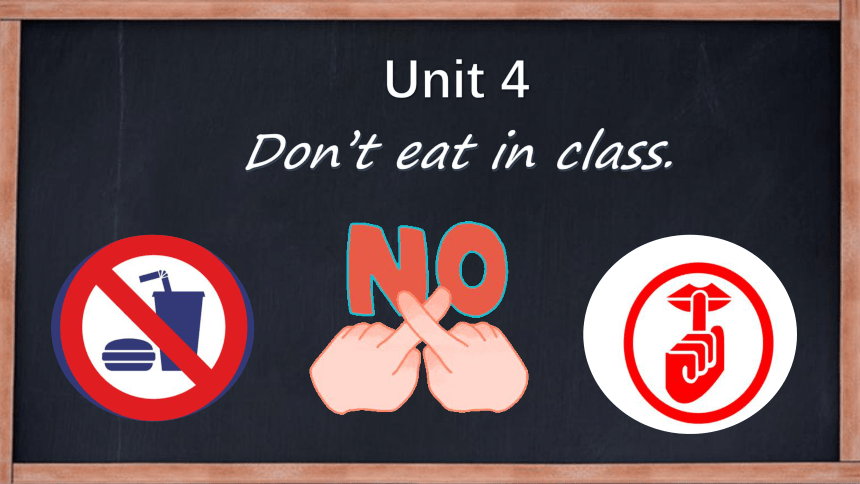
|
|
| 格式 | pptx | ||
| 文件大小 | 3.0MB | ||
| 资源类型 | 试卷 | ||
| 版本资源 | 人教新目标(Go for it)版 | ||
| 科目 | 英语 | ||
| 更新时间 | 2024-04-13 00:00:00 | ||
图片预览

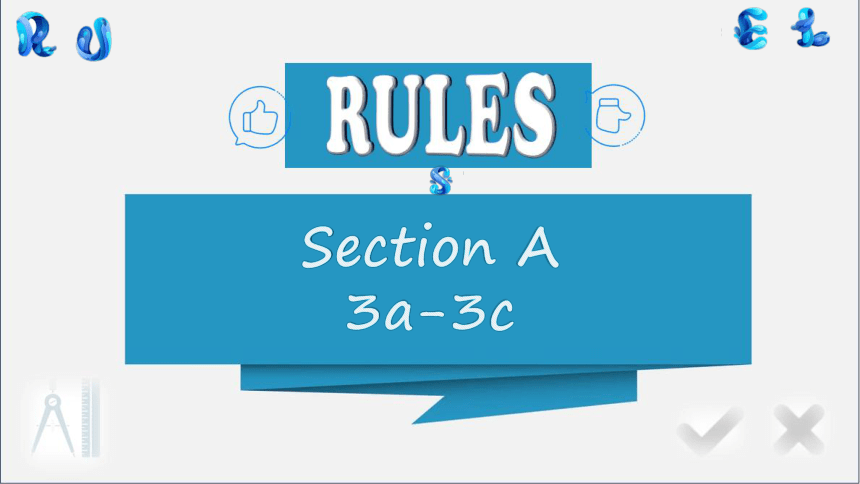
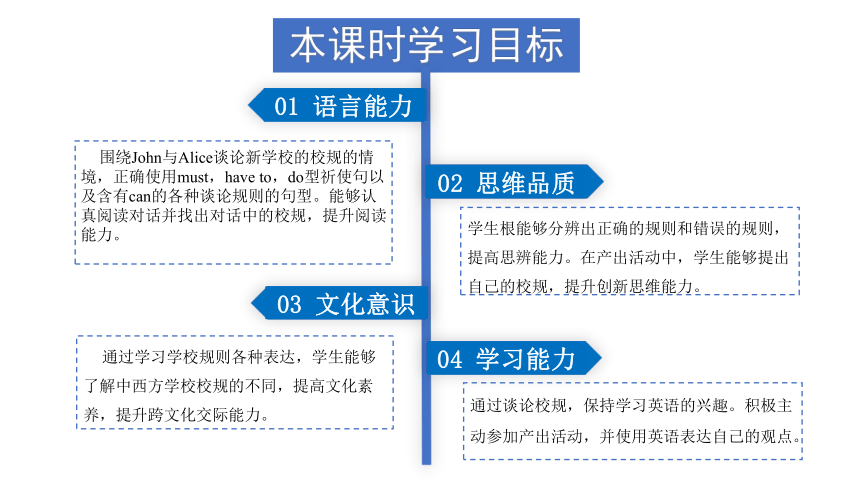
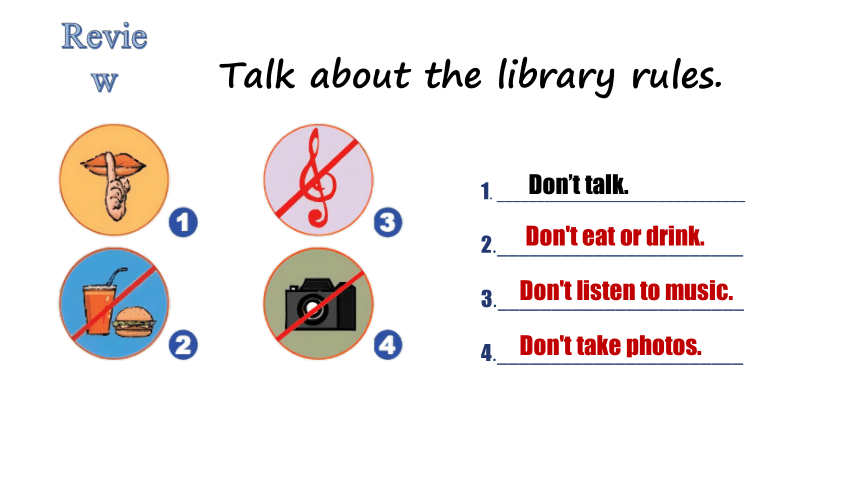
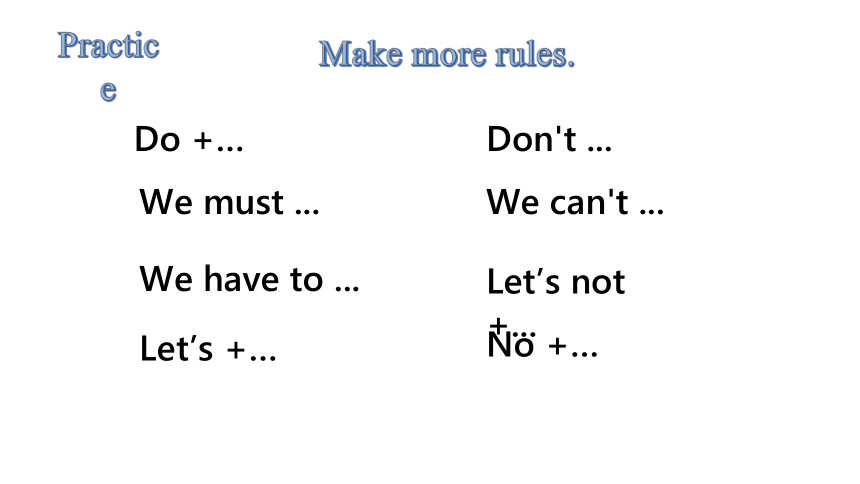
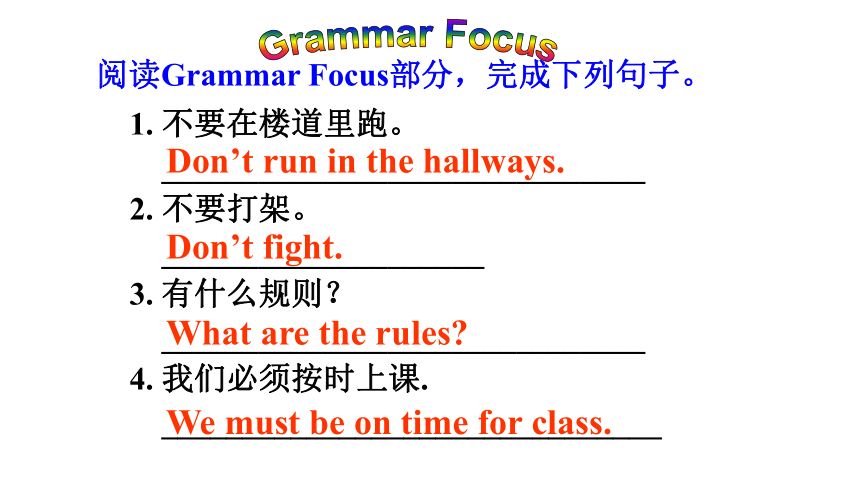
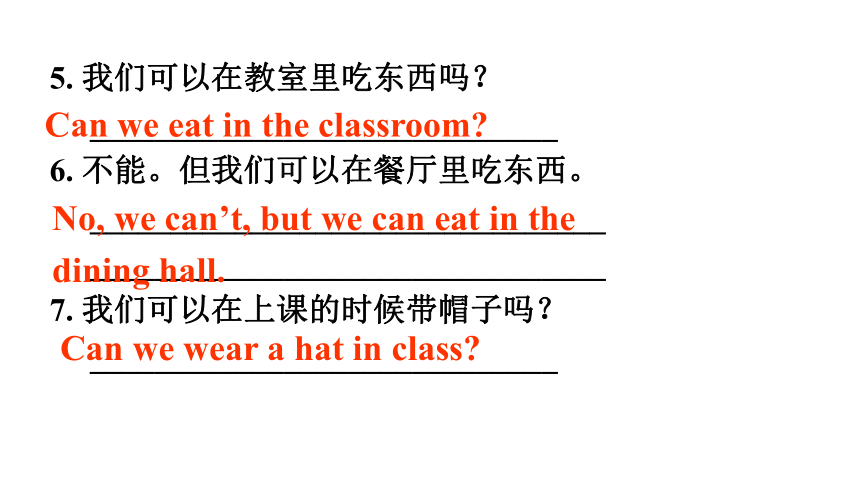
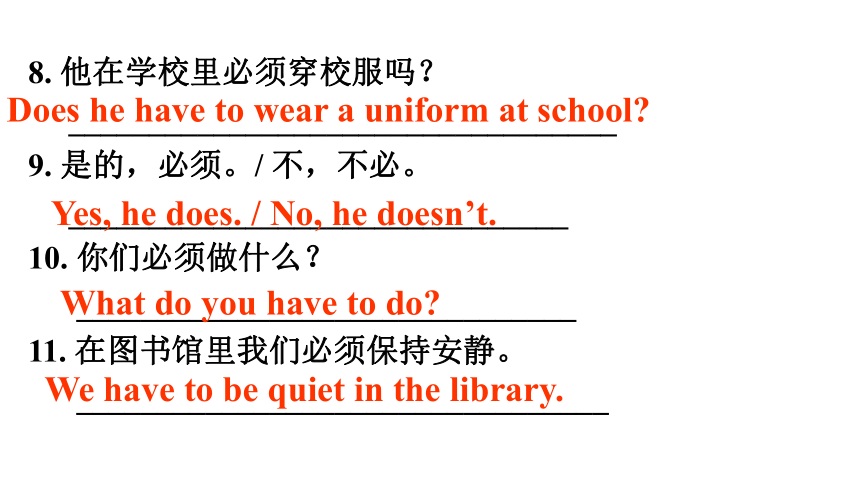


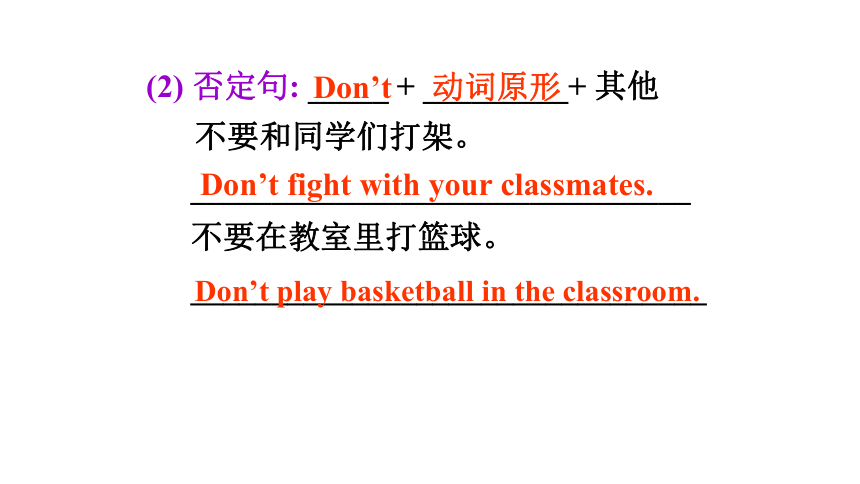
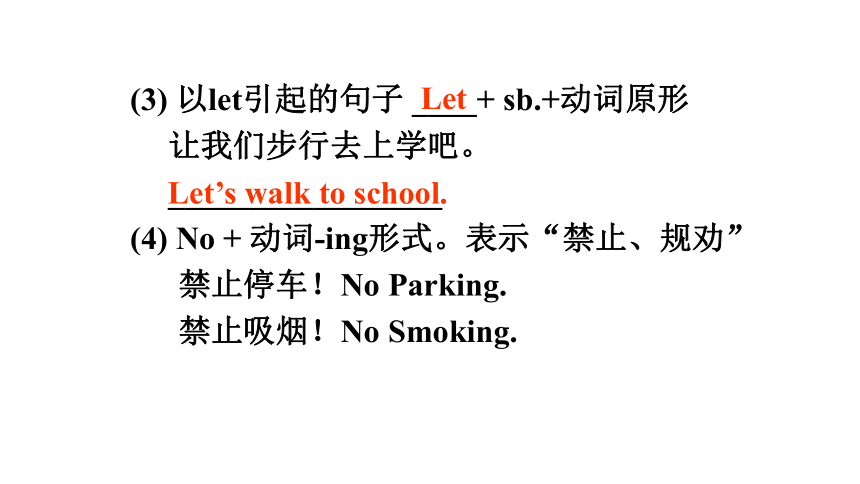
文档简介
(共39张PPT)
Don’t eat in class.
Unit 4
Section A
3a-3c
本课时学习目标
01 语言能力
02 思维品质
03 文化意识
04 学习能力
学生根能够分辨出正确的规则和错误的规则,提高思辨能力。在产出活动中,学生能够提出自己的校规,提升创新思维能力。
通过学习学校规则各种表达,学生能够了解中西方学校校规的不同,提高文化素养,提升跨文化交际能力。
通过谈论校规,保持学习英语的兴趣。积极主动参加产出活动,并使用英语表达自己的观点。
围绕John与Alice谈论新学校的校规的情境,正确使用must,have to,do型祈使句以及含有can的各种谈论规则的句型。能够认真阅读对话并找出对话中的校规,提升阅读能力。
Talk about the library rules.
1. _______________________________
2._______________________
3._______________________
4._______________________
Don't listen to music.
Don't eat or drink.
Don't take photos.
Don’t talk.
Review
Do +…
We must ...
We have to ...
We can't ...
Let’s +…
Don't ...
Let’s not +...
No +…
Practice
Make more rules.
1. 不要在楼道里跑。
______________________________
2. 不要打架。
____________________
3. 有什么规则?
______________________________
4. 我们必须按时上课.
_______________________________
阅读Grammar Focus部分,完成下列句子。
Don’t fight.
Don’t run in the hallways.
What are the rules
We must be on time for class.
Grammar Focus
5. 我们可以在教室里吃东西吗?
_____________________________
6. 不能。但我们可以在餐厅里吃东西。
________________________________
________________________________
7. 我们可以在上课的时候带帽子吗?
_____________________________
Can we wear a hat in class
No, we can’t, but we can eat in the dining hall.
Can we eat in the classroom
8. 他在学校里必须穿校服吗?
__________________________________
9. 是的,必须。/ 不,不必。
_______________________________
10. 你们必须做什么?
_______________________________
11. 在图书馆里我们必须保持安静。
_________________________________
Yes, he does. / No, he doesn’t.
Does he have to wear a uniform at school
What do you have to do
We have to be quiet in the library.
一、祈使句
1. 用法:一般以动词原形开头,表示请
求、命令、劝说、警告等。在祈使句
中,通常省略句子主语第二人称you。
探究乐园
2. 句子结构
(1) 肯定句:__________+ 其他
在餐厅里吃东西。
________________________________
在音乐教室里听音乐。
________________________________
骑自行车去上学。
_________________________________
Ride the bike to school.
Eat in the dining hall.
动词原形
Listen to music in the music room.
(2) 否定句: _____ + _________+ 其他
不要和同学们打架。
_______________________________
不要在教室里打篮球。
________________________________
Don’t fight with your classmates.
Don’t play basketball in the classroom.
Don’t 动词原形
以let引起的句子 ____+ sb.+动词原形 让我们步行去上学吧。 _________________
(4) No + 动词-ing形式。表示“禁止、规劝”
禁止停车!No Parking.
禁止吸烟!No Smoking.
Let
Let’s walk to school.
二、询问和讨论学校规则:
1. ━有什么规则?━我们必须保持安静。
__________________
_____________________
2. ━我们可以在上课的时候戴帽子吗?
________________________________
━不可以。你可以在外面戴帽子。
___________ ______________________
What are the rules
We must be quiet.
Can we wear a hat in class
No, we can’t. You can wear a hat outside.
3. ━你必须做什么事?
_______________________
━我们必须穿校服。
________________________________
4. 他必须在校吃午饭吗?
__________________________________
We must wear the school uniforms.
What do you have to do
Does he have to eat lunch at school
Library Rules
Don’t talk.
__________________
__________________
__________________
3a Write the rules for the school library.
Writing
Don’t listen to music.
Don’t take photos. No photo.
Don’t eat or drink. /
方法指导:
1. 由图示可知都是一些禁止类的祈使句。
2. 可知应用“Don’t + 动词原形”句子,或者 No +n./v-ing.
No eating/ drinking.
No talking.
3b Use the words to make questions about the rules. Then write answers according to your school.
Be quiet
Q: ___________________________________
(she / have to / in the library)
A: ___________________________________
Eat
Q: ___________________________________
(he / have to / in the dining hall)
A: ___________________________________
Does she have to be quiet in the library
Yes, she does.
Does he have to eat in the dining hall
Yes, he does.
Listen to music
Q: ___________________________________
(we / can / in the hallways)
A: ___________________________________
Wear a hat
Q: ___________________________________
(we / can / in the classroom)
A: ___________________________________
Can we wear a hat in the classroom
No, we can’t.
Can we listen to music in the hallways
No, we can’t.
1. 根据例句,可知要求我们造一般疑问句并根据实际情况进行回答。
2. 先确定句子的主语。
3. 再确定用情态动词还是用助动词来构成疑问语序。
4. 根据实际情况做出肯定或否定回答,答语的主语要与问句保持一致。
方法指导
At my dream school, we don’t have to come to school every day. …
We can eat in class. …
3c Make up five cool rules for your
dream school. Share your rules with
the class. Your classmates vote for
the Coolest School!
We don’t have to wear school uniforms. …
We can listen to music in class. …
We can eat in the classroom. …
We don’t have to do homework. …
At my dream school, we don’t have to come to school every day. We can eat in the classroom.
We can listen to music in class.
We don’t have to do homework.
We don’t have to wear school uniforms at school.
Report
Great! Jim’s school is the coolest.
Discuss and make rules for the computer room in your school.
Computer Rules
_______________
_______________
_______________
________________
________________
Group work
We must be quiet in the computer room.
Don’t run in the computer room.
Don’t eat or drink in the computer room.
Wear slippers in the computer room.
Report
Computer Rules
___________________________________
___________________________________
___________________________________
___________________________________
___________________________________
We must be quiet in the computer room.
Don’t eat or drink in the computer room.
Don’t run in the computer room.
Wear slippers in the computer room.
Clean the computer room every day.
library
Do you know the rules in these places
Do you know the rules for the school library
Don’t talk.
Review
dining hall
Do you know the rules in these places
hallways
Do you know the rules in these places
can 能,能够 (表示许可)
—Can I sit here 我可以坐这儿吗?
—No, you can’t.不, 你不能。
can 能,会 (表示能力)
—Can you play basketball
—Yes, I can.
你会打篮球吗?
是的, 我会。
Language points
have to 必须,不得不
don’t / doesn’t have to 不必
你不必在上午七点前到校。
You don’t have to be school before 7:00.
他们在学校必须做什么呢?
What do they have to do at school?
我们要保持安静。
We have to be quiet.
根据句意,用can和can’t填空。
1. Mr. Green_______ smoke here because there’s a sign on the wall. It says “No smoking.”
2. It’s very hot outside. You______ wear a hat.
can’t
can
3. We _______ eat in the classroom because it’s impolite to teachers.
4. I ______ go to bed after 11:00 on school night.
5. The students _____ read books and magazines in the library.
can’t
can
can’t
用have to或has to填空。
1.We ________ clean our classroom after school.
2.She _________ make her bed after getting up.
3.It’s late. Mr. Beckman ________ go to work by car.
4.Emily and Peter join a music club. They __________ practice the guitar every day.
have to
have to
has to
has to
一、单项选择。
1. ____ listen to music in the classroom.
A. Not B.No C.Don't
2. Tom,please ____ the classroom now.
A. clean B.to clean C.cleans
3. Let's ____ on time for classes.
A. be B.be not C.are
4. She has to ____ her homework every night.
A. does B.do C.doing
5. Sorry,you ____ play basketball in the classroom.
A. can't B.don't C.don't have to
C
A
A
B
A
Exercises
二、按要求完成句子。
6. Lily can play the guitar.(改为一般疑问句并作否定回答)
—_____ Lily _____ the guitar
—____,she ______.
7. Jack has to play the piano every weekend.(改为一般疑问句)
_____ Jack ________ play the piano every weekend
8. Be quick.(改为否定句)
__________________________________
9. You can't eat food in class.(改为祈使句)
___________________________________
10. You can't be late for class next time.(改为祈使句)
_____________________________________
Can
play
No
can't
Does
have to
Don't be quick.
Don't eat food in class.
Don't be late for class next time.
11. He has to eat breakfast quickly. (改为一般疑问句)
____________________________________________
12. Play volleyball after class. (改为否定句)
___________________________________________
Does he have to eat breakfast quickly
Don’t play volleyball after class.
13. We can wear sports shoes in class. (改为一般疑问) ___________________________________________
14. Don’t arrive late for class. (改为同义句)
____________________________________________
15. Eric has to do his homework before six. (对划线部分提问)
____________________________________________
Can we wear sports shoes in class
You must be on time for class.
What does Eric have to do before six
根据汉语意思翻译下列句子。
16. 请听我说。
17. 保持安静!
18. 咱们去上学吧。
19. 不要在课堂上讲话。
20. 禁止游泳!
Listen to me, please.
Be quiet!
Let's go to school.
Don't talk in class.
No swimming!
概念
用于表达命令,请求,劝告,警告,禁止等的句子叫做祈使句,析使句最常用于表达命令,祈使句因对象(即主语)是第二人称,所以通常都省略主语。祈使句的动词都为一般现在时,句末则使用句号或感叹号来表示结束。
Do型
肯定结构:Let+宾语+动词原形+其它成分否定结构:Don’t+肯定结构Let+宾语+not+动词原形+其它成分e.g. Let him go. /Don’t let him go./Let him not go.
Let型
Be型
肯定结构;动词原型+其它成分否定结构:Don’t+肯定结构e.g. Eat in the classroom. Don’t eat in the classroom.
肯定结构:Be +表语+其它成分否定结构:Don’t+肯定结构e.g. Be a good student! Don’t be late for school!
Homework
1. Finish the exercises. (A)
2. Make some rules for your desk. (B)
3. Tell your rules to your deskmate. (C)
Thank you !
Don’t eat in class.
Unit 4
Section A
3a-3c
本课时学习目标
01 语言能力
02 思维品质
03 文化意识
04 学习能力
学生根能够分辨出正确的规则和错误的规则,提高思辨能力。在产出活动中,学生能够提出自己的校规,提升创新思维能力。
通过学习学校规则各种表达,学生能够了解中西方学校校规的不同,提高文化素养,提升跨文化交际能力。
通过谈论校规,保持学习英语的兴趣。积极主动参加产出活动,并使用英语表达自己的观点。
围绕John与Alice谈论新学校的校规的情境,正确使用must,have to,do型祈使句以及含有can的各种谈论规则的句型。能够认真阅读对话并找出对话中的校规,提升阅读能力。
Talk about the library rules.
1. _______________________________
2._______________________
3._______________________
4._______________________
Don't listen to music.
Don't eat or drink.
Don't take photos.
Don’t talk.
Review
Do +…
We must ...
We have to ...
We can't ...
Let’s +…
Don't ...
Let’s not +...
No +…
Practice
Make more rules.
1. 不要在楼道里跑。
______________________________
2. 不要打架。
____________________
3. 有什么规则?
______________________________
4. 我们必须按时上课.
_______________________________
阅读Grammar Focus部分,完成下列句子。
Don’t fight.
Don’t run in the hallways.
What are the rules
We must be on time for class.
Grammar Focus
5. 我们可以在教室里吃东西吗?
_____________________________
6. 不能。但我们可以在餐厅里吃东西。
________________________________
________________________________
7. 我们可以在上课的时候带帽子吗?
_____________________________
Can we wear a hat in class
No, we can’t, but we can eat in the dining hall.
Can we eat in the classroom
8. 他在学校里必须穿校服吗?
__________________________________
9. 是的,必须。/ 不,不必。
_______________________________
10. 你们必须做什么?
_______________________________
11. 在图书馆里我们必须保持安静。
_________________________________
Yes, he does. / No, he doesn’t.
Does he have to wear a uniform at school
What do you have to do
We have to be quiet in the library.
一、祈使句
1. 用法:一般以动词原形开头,表示请
求、命令、劝说、警告等。在祈使句
中,通常省略句子主语第二人称you。
探究乐园
2. 句子结构
(1) 肯定句:__________+ 其他
在餐厅里吃东西。
________________________________
在音乐教室里听音乐。
________________________________
骑自行车去上学。
_________________________________
Ride the bike to school.
Eat in the dining hall.
动词原形
Listen to music in the music room.
(2) 否定句: _____ + _________+ 其他
不要和同学们打架。
_______________________________
不要在教室里打篮球。
________________________________
Don’t fight with your classmates.
Don’t play basketball in the classroom.
Don’t 动词原形
以let引起的句子 ____+ sb.+动词原形 让我们步行去上学吧。 _________________
(4) No + 动词-ing形式。表示“禁止、规劝”
禁止停车!No Parking.
禁止吸烟!No Smoking.
Let
Let’s walk to school.
二、询问和讨论学校规则:
1. ━有什么规则?━我们必须保持安静。
__________________
_____________________
2. ━我们可以在上课的时候戴帽子吗?
________________________________
━不可以。你可以在外面戴帽子。
___________ ______________________
What are the rules
We must be quiet.
Can we wear a hat in class
No, we can’t. You can wear a hat outside.
3. ━你必须做什么事?
_______________________
━我们必须穿校服。
________________________________
4. 他必须在校吃午饭吗?
__________________________________
We must wear the school uniforms.
What do you have to do
Does he have to eat lunch at school
Library Rules
Don’t talk.
__________________
__________________
__________________
3a Write the rules for the school library.
Writing
Don’t listen to music.
Don’t take photos. No photo.
Don’t eat or drink. /
方法指导:
1. 由图示可知都是一些禁止类的祈使句。
2. 可知应用“Don’t + 动词原形”句子,或者 No +n./v-ing.
No eating/ drinking.
No talking.
3b Use the words to make questions about the rules. Then write answers according to your school.
Be quiet
Q: ___________________________________
(she / have to / in the library)
A: ___________________________________
Eat
Q: ___________________________________
(he / have to / in the dining hall)
A: ___________________________________
Does she have to be quiet in the library
Yes, she does.
Does he have to eat in the dining hall
Yes, he does.
Listen to music
Q: ___________________________________
(we / can / in the hallways)
A: ___________________________________
Wear a hat
Q: ___________________________________
(we / can / in the classroom)
A: ___________________________________
Can we wear a hat in the classroom
No, we can’t.
Can we listen to music in the hallways
No, we can’t.
1. 根据例句,可知要求我们造一般疑问句并根据实际情况进行回答。
2. 先确定句子的主语。
3. 再确定用情态动词还是用助动词来构成疑问语序。
4. 根据实际情况做出肯定或否定回答,答语的主语要与问句保持一致。
方法指导
At my dream school, we don’t have to come to school every day. …
We can eat in class. …
3c Make up five cool rules for your
dream school. Share your rules with
the class. Your classmates vote for
the Coolest School!
We don’t have to wear school uniforms. …
We can listen to music in class. …
We can eat in the classroom. …
We don’t have to do homework. …
At my dream school, we don’t have to come to school every day. We can eat in the classroom.
We can listen to music in class.
We don’t have to do homework.
We don’t have to wear school uniforms at school.
Report
Great! Jim’s school is the coolest.
Discuss and make rules for the computer room in your school.
Computer Rules
_______________
_______________
_______________
________________
________________
Group work
We must be quiet in the computer room.
Don’t run in the computer room.
Don’t eat or drink in the computer room.
Wear slippers in the computer room.
Report
Computer Rules
___________________________________
___________________________________
___________________________________
___________________________________
___________________________________
We must be quiet in the computer room.
Don’t eat or drink in the computer room.
Don’t run in the computer room.
Wear slippers in the computer room.
Clean the computer room every day.
library
Do you know the rules in these places
Do you know the rules for the school library
Don’t talk.
Review
dining hall
Do you know the rules in these places
hallways
Do you know the rules in these places
can 能,能够 (表示许可)
—Can I sit here 我可以坐这儿吗?
—No, you can’t.不, 你不能。
can 能,会 (表示能力)
—Can you play basketball
—Yes, I can.
你会打篮球吗?
是的, 我会。
Language points
have to 必须,不得不
don’t / doesn’t have to 不必
你不必在上午七点前到校。
You don’t have to be school before 7:00.
他们在学校必须做什么呢?
What do they have to do at school?
我们要保持安静。
We have to be quiet.
根据句意,用can和can’t填空。
1. Mr. Green_______ smoke here because there’s a sign on the wall. It says “No smoking.”
2. It’s very hot outside. You______ wear a hat.
can’t
can
3. We _______ eat in the classroom because it’s impolite to teachers.
4. I ______ go to bed after 11:00 on school night.
5. The students _____ read books and magazines in the library.
can’t
can
can’t
用have to或has to填空。
1.We ________ clean our classroom after school.
2.She _________ make her bed after getting up.
3.It’s late. Mr. Beckman ________ go to work by car.
4.Emily and Peter join a music club. They __________ practice the guitar every day.
have to
have to
has to
has to
一、单项选择。
1. ____ listen to music in the classroom.
A. Not B.No C.Don't
2. Tom,please ____ the classroom now.
A. clean B.to clean C.cleans
3. Let's ____ on time for classes.
A. be B.be not C.are
4. She has to ____ her homework every night.
A. does B.do C.doing
5. Sorry,you ____ play basketball in the classroom.
A. can't B.don't C.don't have to
C
A
A
B
A
Exercises
二、按要求完成句子。
6. Lily can play the guitar.(改为一般疑问句并作否定回答)
—_____ Lily _____ the guitar
—____,she ______.
7. Jack has to play the piano every weekend.(改为一般疑问句)
_____ Jack ________ play the piano every weekend
8. Be quick.(改为否定句)
__________________________________
9. You can't eat food in class.(改为祈使句)
___________________________________
10. You can't be late for class next time.(改为祈使句)
_____________________________________
Can
play
No
can't
Does
have to
Don't be quick.
Don't eat food in class.
Don't be late for class next time.
11. He has to eat breakfast quickly. (改为一般疑问句)
____________________________________________
12. Play volleyball after class. (改为否定句)
___________________________________________
Does he have to eat breakfast quickly
Don’t play volleyball after class.
13. We can wear sports shoes in class. (改为一般疑问) ___________________________________________
14. Don’t arrive late for class. (改为同义句)
____________________________________________
15. Eric has to do his homework before six. (对划线部分提问)
____________________________________________
Can we wear sports shoes in class
You must be on time for class.
What does Eric have to do before six
根据汉语意思翻译下列句子。
16. 请听我说。
17. 保持安静!
18. 咱们去上学吧。
19. 不要在课堂上讲话。
20. 禁止游泳!
Listen to me, please.
Be quiet!
Let's go to school.
Don't talk in class.
No swimming!
概念
用于表达命令,请求,劝告,警告,禁止等的句子叫做祈使句,析使句最常用于表达命令,祈使句因对象(即主语)是第二人称,所以通常都省略主语。祈使句的动词都为一般现在时,句末则使用句号或感叹号来表示结束。
Do型
肯定结构:Let+宾语+动词原形+其它成分否定结构:Don’t+肯定结构Let+宾语+not+动词原形+其它成分e.g. Let him go. /Don’t let him go./Let him not go.
Let型
Be型
肯定结构;动词原型+其它成分否定结构:Don’t+肯定结构e.g. Eat in the classroom. Don’t eat in the classroom.
肯定结构:Be +表语+其它成分否定结构:Don’t+肯定结构e.g. Be a good student! Don’t be late for school!
Homework
1. Finish the exercises. (A)
2. Make some rules for your desk. (B)
3. Tell your rules to your deskmate. (C)
Thank you !
同课章节目录
- Unit 1 Can you play the guitar?
- Section A
- Section B
- Unit 2 What time do you go to school?
- Section A
- Section B
- Unit 3 How do you get to school?
- Section A
- Section B
- Unit 4 Don't eat in class.
- Section A
- Section B
- Unit 5 Why do you like pandas?
- Section A
- Section B
- Unit 6 I'm watching TV.
- Section A
- Section B
- Review of Units 1-6
- Unit 7 It's raining!
- Section A
- Section B
- Unit 8 Is there a post office near here?
- Section A
- Section B
- Unit 9 What does he look like?
- Section A
- Section B
- Unit 10 I'd like some noodles.
- Section A
- Section B
- Unit 11 How was your school trip?
- Section A
- Section B
- Unit 12 What did you do last weekend?
- Section A
- Section B
